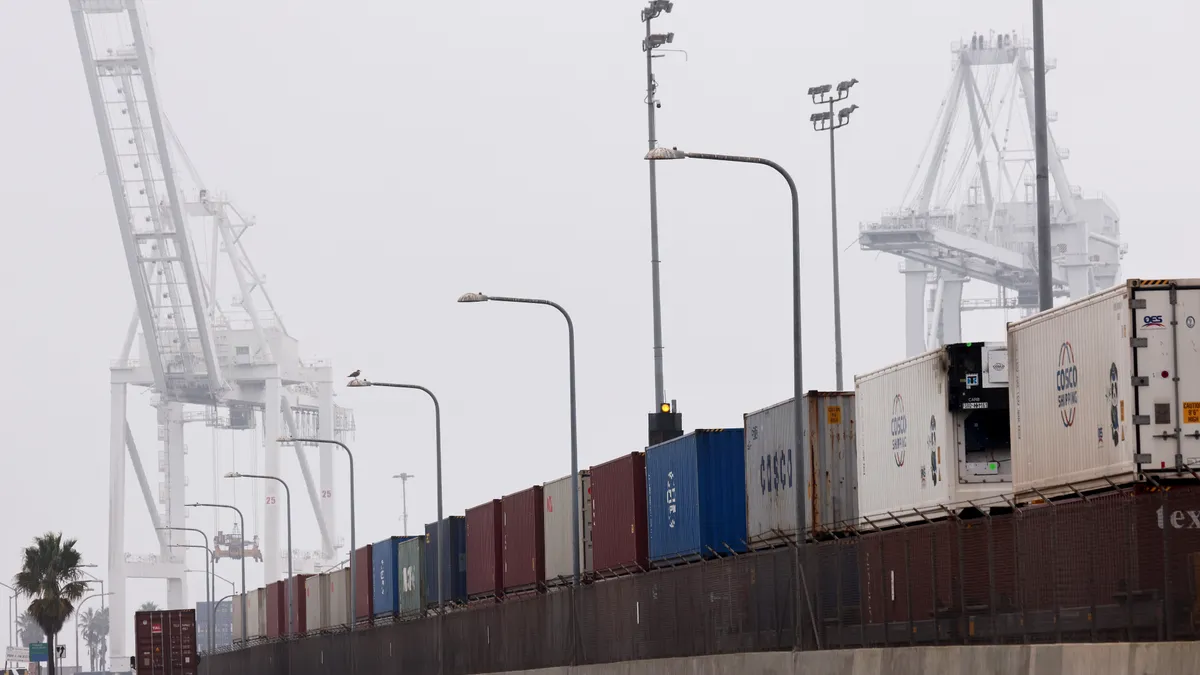A shipper advisory group to the Federal Maritime Commission is asking the agency to expand its authority over demurrage fees charged by ports and railroads at ocean terminals.
The National Shipper Advisory Committee voted April 27 to recommend the FMC expand its authority to include oversight over certain demurrage fees charged by railroads, which has hit record highs in recent months. The committee, comprised of 24 importers and exporters, also voted to recommend the FMC adopt a new rule aimed at preventing ocean carriers from passing along costs associated with ports' terminal dwell fees.
Supply chain congestion has contributed to a major rise in demurrage fees, which are charged after cargo lingers beyond a certain point. Shippers have complained they shouldn't be on the hook for charges when they are not the cause of congestion.
"We're on the hook to pay for a problem that we may be partially helped to create but we are certainly not the sole owner," Debb Minskey, trade lane manager at Ikea, said at the April committee hearing. "But we're the only ones paying for it."
The advisory committee, formed last May to help inform the FMC on potential solutions to ocean shipping bottlenecks, is recommending the agency expand authority over demurrage fees to include intermodal cargo and port terminal dwell fees.
The committee argues the FMC should have oversight over all parties involved in a bill of lading. As rail carriers are subcontractors to ocean carriers, the committee says, they should therefore be subject to FMC regulation.
"The spirit of the FMC’s oversight should be founded at the Bill of Lading level through to the final destination defined by the shipment parties," the advisory group said in its recommendation to the FMC.
The committee also pushed back against dwell fees some West Coast ports have charged in a bid to clear congestion, arguing that carriers should be prevented from passing along the costs and be the one to dispute improperly applied charges.
The ports of Los Angeles and Long Beach announced last October a $100 fee for each container left on terminals for nine days or more, with an additional $100 fee for each day the cargo is not moved. The ports recently moved to extend their power to impose the fee until July 28, although fee implementation has been delayed since the start of the program.
The Port of Seattle, however, has implemented a terminal dwell fee as have some marine terminal operators, the advisory committee
Ports have argued that the threat of a dwell fee has contributed to improvements in congestion — the San Pedro Bay port complex, for example, has seen a 50% reduction in aging cargo since October.
Shippers, however, say carriers should be responsible for those charges.
"The application of such charges should not be borne by the importer who cannot be incentivized by the application of these punitive charges to collect the cargo from the terminal any sooner," the committee said in its recommendation.
The committee's recommendations also come as FMC Commissioner Carl Bentzel spearheads an initiative to establish data standards and practices to help speed up the flow of cargo. Bentzel said there's a difference in the data carriers provide, with some industries being more transparent than others.
Bentzel has conducted 16 meetings on data collection, and the information shared during those meetings is set to be unveiled during the Maritime Data Summit on June 1. Bentzel is thinking of adding one more open session to talk to companies that have already integrated data from different carriers "just to sort of see what they can do using the existing data sources," he said on a call with Supply Chain Dive.
Other federal agencies have also pushed for more harmonized shipping data. U.S. Customs and Border Protection, the Department of Transportation, the Department of Agriculture and the State Department have expressed interest in the FMC's data initiative and "we're in constant contact with them," Bentzel said in the meeting.
"I truly believe we're the furthest along in terms of looking at the information systems that are out there and collecting it," he said.
Editor's note: This story was first published in our Logistics Weekly newsletter. Sign up here.















